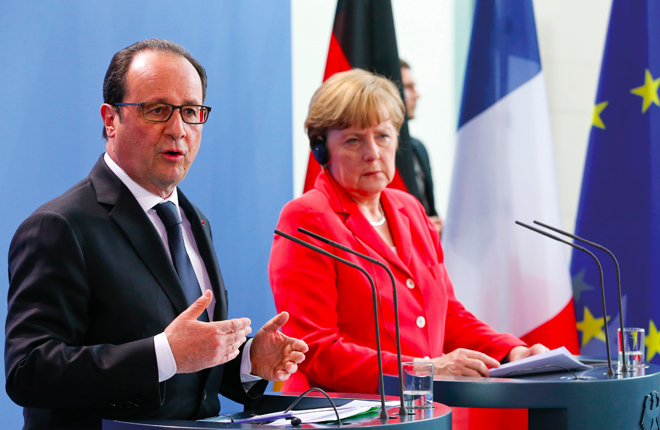
Brexit is already proving damaging for the UK, while the impact on the rest of the EU remains modest. This seems to send a clear message to anyone else considering an exit.
On 23 June, the British population defied the advice of the vast majorityofdomesticand inter- national political leaders, economic and financial institutions, the business elite and most of the media and voted to leave the EU.
The vote has already had three clearly negative effects on the UK, but the fre- quently predicted negative consequences for therestof Europehavenotmaterialised. First, the vote to leave the EU has caused deep uncertaintyin the UKwith re- spect to politics and policies. While the leadership vacuum after Prime Minister David Cameron’s resignation was resolved faster than expected, the new prime min- ister, Theresa May, is struggling with potentially unresolvable issues.
Unsurprisingly, May’s first trip as prime minister was to Edinburgh for a meeting with First Minister Nicola Sturgeon, who had predictably responded to the Brexit votewith a vowto hold anotherreferendum on Scottish independence. Holding the UK together isno doubt paramount to Theresa May. The new prime minister’s second trip wasto Berlin and Paris, where the message wasclear: the EU wantsgood relations, but will not allow May to cherry-pick from its agenda. Access to the single market and ‘passporting’ (which is critical for London’s financial industry to continue to roam across Europe) will be conditional upon the continued free movement of people. And negotiations will not begin until the UK has invoked Article 50, which in turn will start a clockthatrunsfor onlytwo years. Thisputs the UK between a rock and a hard place.
On the one hand, Theresa May has committed herself to Brexit and suggested that Art. 50 will be invoked early next year. On the other hand, with important elec- tions in the Netherlands, France and Ger- many during 2017, the EU is unlikely to show any flexibility towards the UK during this period. The European Parliament, which will need to approve whatever terms the UK receives, will hold new elections in 2019, putting a major premium on having a deal before then. Getting a divorce agrement in this time frame that splits assets and liabilities (includingpension obligations) may be feasible, but getting a bespoke and comprehensive trade deal which avoidsthe extreme outcomes of a Norway-like deal (i.e., take it all and pay, but without influ- ence) and no deal (i.e., a road to WTO-only) is impossible.
Second, the market did not like the out- come of the Brexit vote and the uncer- tainty that came with it. The pound has dropped by more than 10% as investors have become nervous about the UK’s abil- ity to attract the necessary investments and loans from abroad to finance its near- record current account deficit. The real es- tate sector is particularly vulnerable, and several major investment funds have sus- pended withdrawals from their property- related funds. In contrast, European markets shrugged off the event rather easily. Eurozone sovereign peripheral spreads, for example, have hardly moved.
Third, the Brexit decision has also led to a drastic slowingdown of the UKeconomy. Particularly, investments are being put on hold, and earlyindicationssuggestthatex- port orders are not measurably picking up in spite of the weaker pound. In early Au- gust, the Bank of England revised its 2017 GDP forecast to 0.8% (down from 2.3%) and therefore cut interest ratesby 0.25%. It also introduced a new scheme to ensure that the lower rates will be passed on to new lending and announced additional quantitative easing.
These measures, along with a less austere fiscal program, will help cushion the blow. But at UniCredit Research, we still think the UK economy will come to a halt and most likely move into recession during the next 12-18 months. Stimulus of demand will help – indeed, the UK may soon see a dose of (unannounced) ‘helicopter money’, as larger-than previously-planned budget deficits are being broadly matched by the new round of QE in order to vacuum up the additional debt financing. While that may help in the short term, the underlying problem is now structural: what type of trade and investment regime will the UK end up with relative to its commercial partners in Europe and the rest of the world? Nobody will know for several years.
While these effects on the UK were broadly expected, most commentators extended their concerns to Europe. These concerns, however, have thus far not been justified. The political implications in Europe have been the opposite of the oft-predicted domino effect in which others would follow the UK out of the EU. The Spanish elections (held directly after the Brexit vote) surprised everyone with a clear swing back to pro-EU mainstream parties.
Meanwhile opinion polls in virtually all other European countries have steadied or strengthened mainstream (pro-EU) parties, even as Europe has suffered several terror attacks, events which have historically tended to increase support for more nationalistic parties. Meanwhile, the economic outlook for Europe has only marginally weakened.
Businesses report that they only expect a slowdown in exports to and investment in the UK, with virtually no other negative effects.
It is still early days after the UK’s shocking decision to leave the EU, but the effects are already clear: the UK is a politically and economically weaker country today than it was before 23 June. One would hope there might be a way back from this ill-conceived decision, but it would take more change in the UK political landscape than one could reasonably expect in the present environment.
Brexit is already proving damaging for the UK, while the impact on the rest of the EU remains modest. This seems to send a clear message to anyone else considering an exit.






